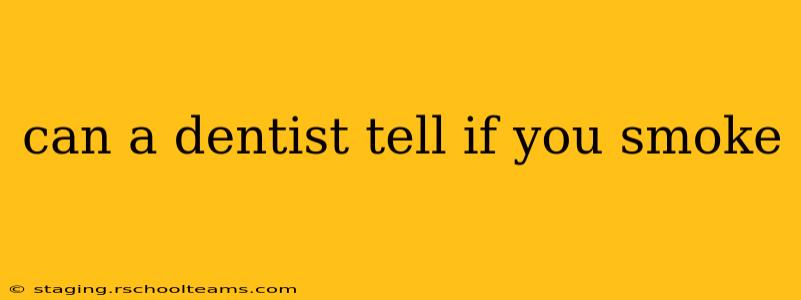Can a Dentist Tell If You Smoke?
Yes, a dentist can often tell if you smoke, and quite readily. The telltale signs are numerous and visible during a routine dental examination. While a dentist can't definitively confirm smoking solely through observation, several indicators strongly suggest a smoking habit. This article explores the various ways dentists can detect smoking and the implications for your oral health.
What signs does a dentist look for?
Dentists are trained to spot several oral health issues directly linked to smoking. These include:
- Stained Teeth: This is perhaps the most obvious sign. Nicotine and tar in cigarettes stain teeth a yellowish-brown or even dark brown color. The staining is typically more pronounced on the surfaces of the teeth facing the tongue. While certain foods and drinks can stain teeth, the characteristic discoloration from smoking is usually quite distinct.
- Gum Disease (Periodontitis): Smoking significantly increases the risk of gum disease. Dentists look for signs of gum inflammation (gingivitis), receding gums, and pockets of infection between the teeth and gums. Smokers often have more severe and persistent gum disease than non-smokers, making it easier for a dentist to identify.
- Halitosis (Bad Breath): Persistent bad breath is another common indicator of smoking. The smell is often described as stale, smoky, or acrid, distinct from other types of bad breath. This odor can persist even after brushing and flossing.
- Oral Cancer Lesions: Smoking is a major risk factor for oral cancer. During an examination, a dentist will carefully check the mouth, tongue, lips, and throat for any unusual growths, sores, or lesions that may be indicative of oral cancer or precancerous conditions. Early detection of oral cancer is crucial for successful treatment.
- Slow Wound Healing: Smokers often experience slower wound healing in the mouth, making it harder for any minor injuries or procedures to heal properly. This can be observed during post-treatment check-ups.
- Reduced Saliva Production: Smoking can decrease saliva production, leading to dry mouth (xerostomia). Dry mouth can increase the risk of cavities and gum disease.
How accurate is a dentist's assessment?
While not a foolproof method, a dentist's assessment of smoking based on these observable signs is highly reliable. The combination of several indicators makes it much more likely that a dentist will accurately determine if a patient smokes.
Can a dentist tell if you've quit smoking recently?
Even after quitting, some of the signs of smoking, such as staining and gum disease, may persist for some time. However, the rate of improvement in oral health after quitting smoking can be a useful indicator to a dentist that a patient has made a positive change.
Does a dentist have to report if they find out someone smokes?
No, a dentist does not have a legal obligation to report a patient's smoking status. Information disclosed during a dental examination is protected by patient confidentiality.
Why is it important for dentists to know if you smoke?
Knowing whether a patient smokes is critical for providing appropriate dental care. This information informs treatment plans, risk assessments, and recommendations for maintaining optimal oral health. It allows dentists to provide tailored advice on managing smoking-related oral health issues.
In conclusion, while a dentist might not directly ask if you smoke, the various observable signs often provide strong indications of a smoking habit. This information is crucial for personalized dental care and promoting the overall health of your mouth.
